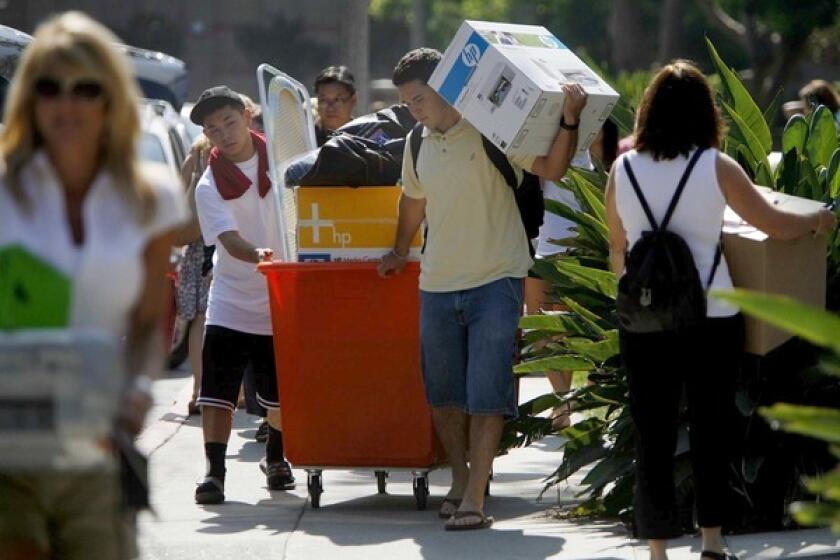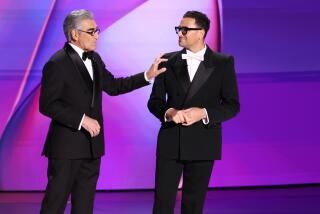For families isolating together, ‘Schitt’s Creek’ is the perfect pandemic sitcom
- Share via
It is impossible for me to overstate how deeply attached I have become to “Schitt’s Creek” during the COVID-19 pandemic.
Shamefully, I am one of those super-annoying come-lately fans. While my colleague Robert Lloyd beat the drum for the Canadian comedy from its premiere, I didn’t get around to watching the Pop TV show until it started streaming on Netflix. Then, of course, I couldn’t stop. Hilarious on 87 levels, many of which were finally acknowledged this year with the show’s multiple Emmy nominations, it is a broadcast series that was absolutely built to binge. And I continued to do so until its final season this year.
Which I bought. With my own money. For the record, I have never been so obsessed that I paid to screen a television series that was mere months away from being on Neflix.. But we were all stuck sheltering at home and I just couldn’t wait.
That’s how much I loved “Schitt’s Creek.”
I use the past tense because now, four months later, love doesn’t begin to cover it. In search of succor, as we all are so much of the time now, I began re-watching the series from the beginning and I had to wonder how much creator Dan Levy knew and when he knew it.
The story of a family coming to grips with reduced circumstances now feels like the parable of an age.
Costume designer Debra Hanson and her team take actress Catherine O’Hara’s ‘more is more’ attitude for ‘Schitt’s Creek’ and run with it.
Having been bilked by their accountant, the Rose family — Moira (Catherine O’Hara), Johnny (Eugene Levy), Alexis (Annie Murphy) and David (Dan Levy) — is forced to relocate to the tiny town of Schitt’s Creek, which Johnny bought for David as a joke. They take up residence in a local motel, overseen by Stevie Budd (Emily Hampshire), who acts, initially, as hilariously dead-pan straight woman to their rich-people histrionics — and later as a bellwether of their transformation. It is a situation they vow is only temporary.
Watching the Rose family go through the five stages of grief over their dislocation — six, actually, since in this case “horror” most certainly precedes “denial” and crops up at various in-between stages — it is impossible not see my own family’s journey through the pandemic. Once scattered across the country with the three kids entering various stages of independence, the five of us are now living under one roof at a level of daily intimacy we have never experienced before.
We too believe it is only temporary, but as the weeks have turned into months and milestones we hoped would occur with some normalcy keep moving down the entire calendar — OK, no July 4, probably no Halloween, but surely, we’ll be able to celebrate Christmas — the elasticity of the word “temporary” has been forced upon us.
Clearly, what we hoped was a miniseries has been ordered up for at least a second season.
And yes, this is Los Angeles, which obviously cuts a wider swath than Schitt’s Creek. Yet in doing our bit to end this pandemic, we might as well live in a town even smaller. Downtown, the beach or indeed any L.A. neighborhood beyond a three-mile radius of our home has become, like “Schitt’s Creek’s” nearby town of Elmdale, an aspirational and only occasional destination. Like the Roses, we tread a well-worn path between a few nearby establishments. Though what I wouldn’t give to slide into a booth at the Tropical Café! Or attend anything remotely resembling a concert by Schitt’s Creek’s own Jazzagals!
Mind you, “Schitt’s Creek” did not invent the humor of confinement. It is a situation comedy, and situation comedies are, by nature, experiments in controlled environments. A small group of people exist in a limited world, and while events may occur off stage or guest stars stop by for a chat, that is not the point. The interactions and relationships between the main characters are what drive the comedy and the show. Like many modern comedies, “Schitt’s Creek” is single-camera, which means the story is not confined to soundstages — the Roses and their friends are often seen outside, though usually in pairs or trios and even then, the action remains, for the most part, interaction.
As with so many of us, on our daily walks.
This year has been a lot. As the can-do optimism many of us felt earlier in the coronavirus shutdown wears thin, random crying jags are only natural.
Those of us lucky to be away from the front lines of the pandemic are living in our own sitcom these days, and, like “Schitt’s Creek,” it is a tragi-comedy revolving around changed circumstances. Our cities and neighborhoods may offer more malls, movie theaters and museums than even Elmdale, but they’re not open. We might be able to afford the kind of international travel that got Alexis into so many bizarre situations — “OK, you try parallel parking in a burka, David. No amount of flirting can get you out of that” may be one of my favorite lines of dialogue ever — but we can’t go anywhere much.
Instead, we, like the Roses, are left blinking at our family or pod members, sniping over one’s messiness and another’s habit of repeating what was just said, trying to get creative with our interior spaces and reacquainting ourselves with the house rules of wig maintenance or whatever particular quirk requires rules.
During my re-watch, I cannot tell you how many times I have yelped in recognition — the adult child half-lying on the bed, constructing a cone of silence using only smartphone and sheer obstinate will; the siblings, pausing midfight to unite in disbelief over something a parent has said or done; the mother vacillating between self-conscious attempts at optimism and self-pitying cries of desolation.
Particularly the last.
Mercifully, Dan Levy and his writing team are good-hearted souls whose scathing wit and insight are tempered by a humane belief in transformation and even transcendence. (They are Canadian after all.) “Schitt’s Creek” is a morality play. Distracted by expansive possibility, the Roses, like many modern families including ours, have become disconnected, from one another and from their own internal selves. They have bought into the idea that wealth ensures control and that control is the ultimate status symbol. Having that control shattered, along with the assumptions built upon it, leaves them in disbelief — surely it will be restored quickly and with little effort.
Sound familiar?
Even though she really misses her college, and wants out of our house, my daughter decided the risks outweigh the benefits and is taking her classes from home.
At first, Johnny, Moira, Alexis and David are bound mostly by a shared rejection of the situation they find themselves in, then they treat it as an unnecessary but quirky learning experience. At one point, it appears their problems will be solved by the sale of the town. But the early reopening of their lives backfires and they return to the confines of their new normal. As time passes, they begin to move forward in Schitt’s Creek, to build new sorts of lives so that when the end finally arrives, the thought of leaving is as bitter as it is sweet.
Now, I don’t think anyone will view the end of these pandemic times with anything except sheer gratitude; the parallels are not in any way perfect. Levy set out to imagine what would happen if a wealthy, privileged family had everything stripped away. The coronavirus did not target wealth or privilege; just the opposite.
But for me, the hilarity of watching a family come to terms with sudden limitations and unparalleled mutual dependence offers both a respite from and a perspective on our own experiences with these things. If nothing else, it has definitely drawn attention the number of times certain phrases — “stop,” “this is a lot,” “look at you” “where did you get that?” — have been uttered in our household. Because my kids love “Schitt’s Creek” as much as I do, “Oh, my God, Alexis/David” has become instant shorthand, and a much friendlier substitute, for calling out certain types of behavior — and David- and Alexis-like tones and gestures have helped defuse more than a few potential blow-ups. We haven’t gone so far as putting up a Rosebud Motel sign on the house, but we’re getting pretty darn close.
Oh, and for the record, none of us has ever attempted to mimic Levy’s Johnny or O’Hara’s Moira. The Lord’s work is best left to the masters.
More to Read
The biggest entertainment stories
Get our big stories about Hollywood, film, television, music, arts, culture and more right in your inbox as soon as they publish.
You may occasionally receive promotional content from the Los Angeles Times.













